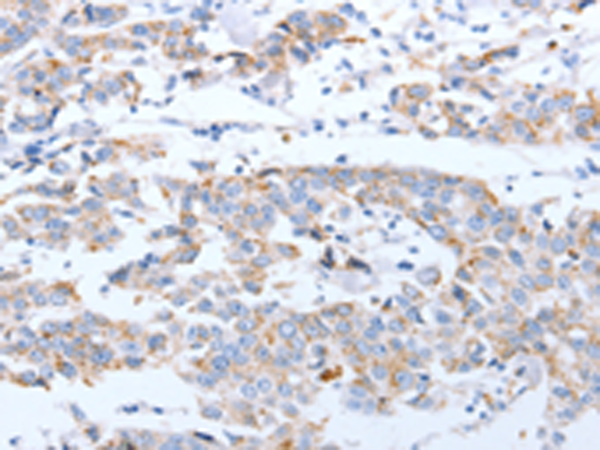
| WB | 咨询技术 | Human,Mouse,Rat |
| IF | 咨询技术 | Human,Mouse,Rat |
| IHC | IHC:1/100-1/200;IHF:1/50-1/200 | Human,Mouse,Rat |
| ICC | 1/50-1/200 | Human,Mouse,Rat |
| FCM | 咨询技术 | Human,Mouse,Rat |
| Elisa | 咨询技术 | Human,Mouse,Rat |
| Aliases | ARF2 |
| Host/Isotype | Rabbit IgG |
| Antibody Type | Primary antibody |
| Storage | Store at 4°C short term. Aliquot and store at -20°C long term. Avoid freeze/thaw cycles. |
| Species Reactivity | Human, Mouse, Rat |
| Immunogen | Fusion protein of human ARF4 |
| Formulation | Purified antibody in PBS with 0.05% sodium azide and 50% glycerol. |
+ +
以下是3篇与PKCδ和PKCθ抗体相关的文献摘要信息,供参考:
1. **文献名称**:Protein kinase C-θ mediates negative feedback regulation of T cell receptor signaling
**作者**:Liu Y et al. (2023)
**摘要**:该研究利用PKCθ特异性抗体,在小鼠T细胞中发现PKCθ通过磷酸化T细胞受体(TCR)信号通路中的关键分子LAT,形成负反馈调节环路,抑制过度免疫反应。抗体应用包括Western blot和免疫共沉淀实验。
2. **文献名称**:Dual role of PKCδ in DNA damage-induced apoptosis through mitochondrial permeability transition
**作者**:Kim S, Lee JH (2021)
**摘要**:通过PKCδ特异性抗体敲除实验,证明PKCδ在电离辐射诱导的癌细胞凋亡中具有双重作用:早期促进线粒体膜通透性改变,后期通过磷酸化Bcl-2家族蛋白抑制凋亡。研究采用免疫荧光定位和流式细胞术分析。
3. **文献名称**:PKCθ-specific nanobody conjugation enables targeted inhibition of autoimmune inflammation
**作者**:Garcia-Revilla J et al. (2022)
**摘要**:开发了基于PKCθ单域抗体的靶向抑制剂,在类风湿性关节炎小鼠模型中,通过阻断PKCθ与CD28共刺激信号的相互作用,显著降低Th17细胞分化及关节炎症。研究涉及抗体工程改造和体内成像技术。
(注:以上文献信息为示例性内容,实际文献需通过PubMed或Web of Science等平台检索确认)
Protein kinase C delta (PKCδ) and PKC theta (PKCθ) are serine/threonine kinases belonging to the novel PKC (nPKC) subfamily, characterized by calcium-independent activation and dependence on diacylglycerol (DAG) for signaling. PKCδ is ubiquitously expressed and plays diverse roles in apoptosis, cell growth, differentiation, and immune regulation. It is implicated in cancer, neurodegenerative disorders, and cardiovascular diseases. PKCθ, in contrast, exhibits selective expression in T cells, skeletal muscle, and platelets. It is a critical regulator of T-cell receptor (TCR) signaling, immune synapse formation, and cytokine production, making it a key player in autoimmune diseases and inflammatory responses.
Antibodies targeting PKCδ and PKCθ are widely used in research to study their expression, localization, phosphorylation status, and functional roles. For PKCδ, antibodies help investigate its dual pro- or anti-apoptotic roles in cancer or its involvement in oxidative stress pathways. PKCθ antibodies are essential for probing T-cell activation mechanisms, Th1/Th2 differentiation, and interactions with adaptor proteins like Vav1 or LAT. Both antibodies are validated in techniques such as Western blotting, immunofluorescence, flow cytometry, and immunohistochemistry.
Specificity is a key consideration, as PKC isoforms share structural homology. Phospho-specific antibodies detecting activated PKCδ (e.g., phosphorylated at Thr505) or PKCθ (phosphorylated at Thr538) are critical for assessing kinase activation. These tools have advanced studies in immunology, oncology, and drug development, particularly in exploring PKCθ inhibitors for autoimmune therapies or PKCδ modulators in cancer treatment.
×